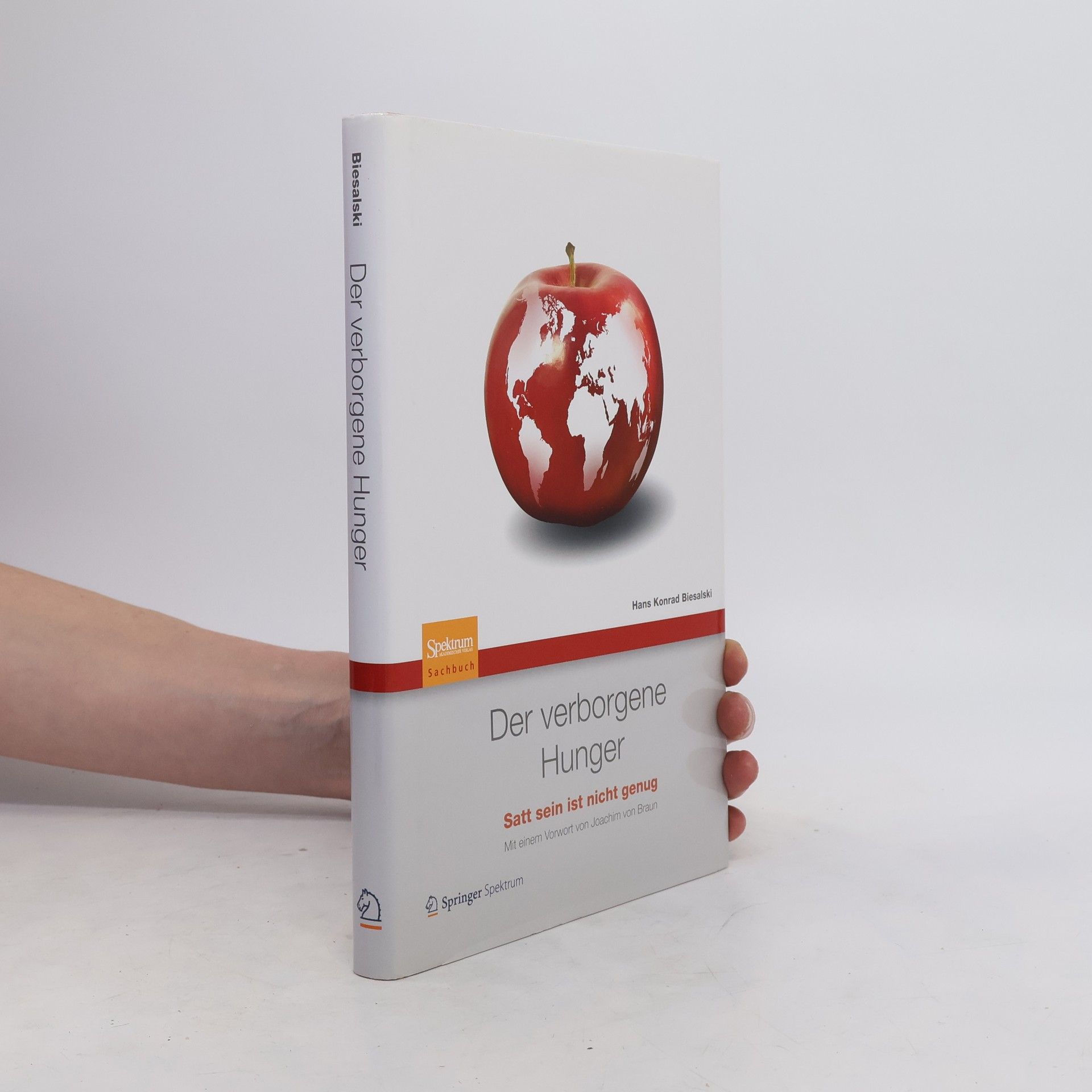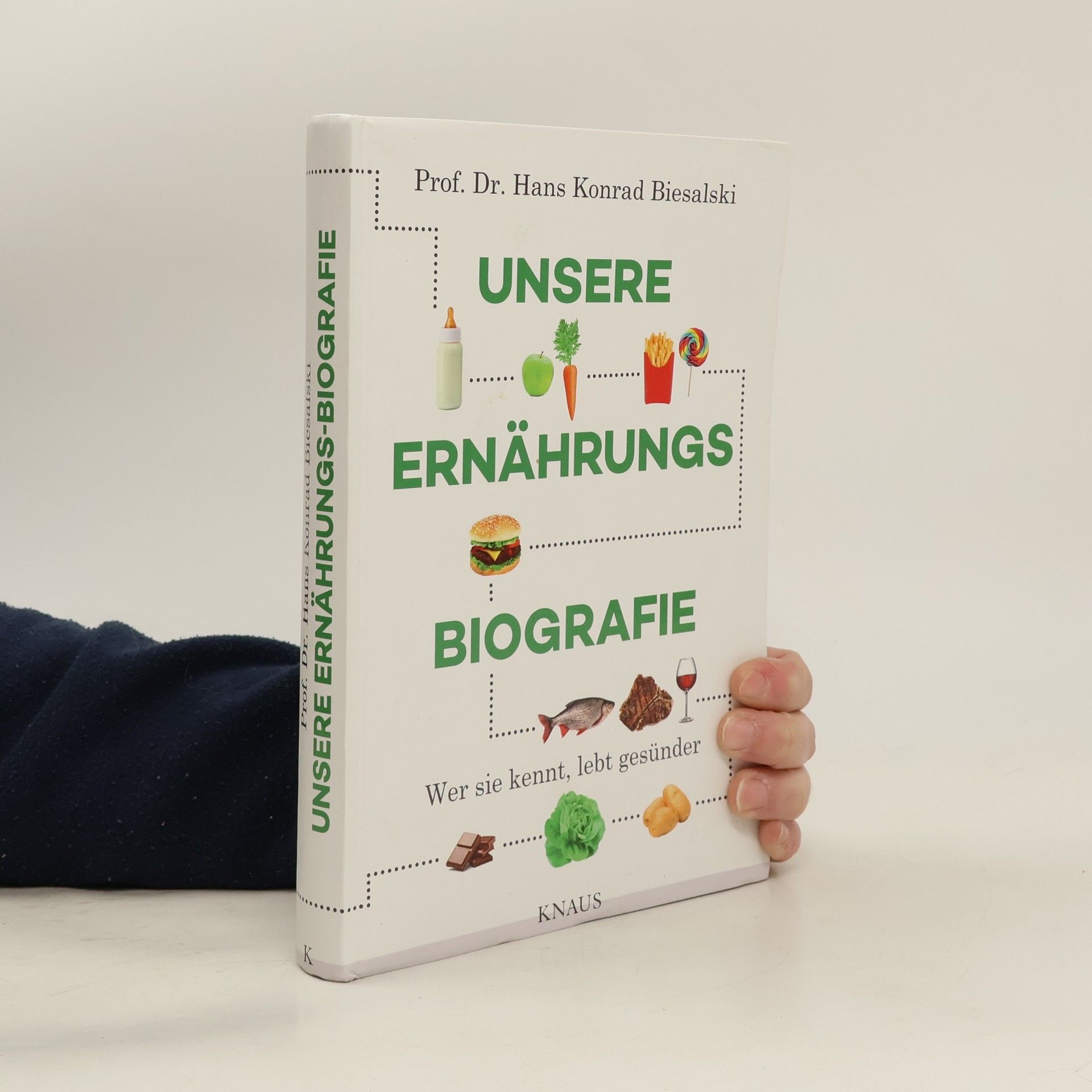Zuverlässiges Basiswissen - Grundlagen der Ernährungsphysiologie - Praxisnahe Informationen zum Verständnis pathophysiologischer Abläufe Klinische Ausrichtung - Alle ernährungsabhängigen Krankheiten - Prävention ernährungsbedingter Krankheiten - Diagnostik und ernährungsmedizinische Therapie - Nahrungsmittelallergien, Lebensmittelsicherheit, Ernährung und Medikamente Überzeugende Didaktik - Integrierte Nährwerttabellen - Ernährungsempfehlungen - Konkrete Ernährungsempfehlungen zu jedem Krankheitsbild - Curriculum der Bundesärztekammer - Praktische Tipps zur Ernährungsberatung
Hans-Konrad Biesalski Libros






Das neue Wissen über gesunde Ernährung, verborgenen Hunger und sinnlose Diäten Um Ernährung kommen wir nicht herum, sie begleitet uns das ganze Leben – wir haben tatsächlich eine Ernährungsbiografie - auch wenn uns das nur selten bewusst ist. Je nach Alter favorisieren wir einen bestimmten Lebensstil und probieren immer wieder neue Ernährungsformen oder Diäten aus. Dabei kann es zu folgenschweren Mangelerscheinungen kommen, die uns dick und krank machen. Endlich ein Buch, das die Vor- und Nachteile der wichtigsten Diäten und Ernährungsratschläge umfassend analysiert. Hans Konrad Biesalski, der renommierte Ernährungsmediziner, erklärt, wie wir unsere Ernährungsbiografie so gestalten, dass wir gesund bleiben. Ausstattung: mit einigen Abbildungen
Mit aussagekräftigen Bildtafeln wichtige Aspekte der Ernährung und ihr Zusammenspiel begreifen. Klinische Hinweise verweisen von der Theorie zur Ernährungspraxis und sind im Text hervorgehoben. Schneller Überblick: jedes Thema auf einer Text-Bild-Doppelseite - Grundlagen der Ernährung - Nährstoffe, Vitamine und Mineralstoffe - Praktische Aspekte und Ernährungsmedizin
Eine unzureichende Versorgung mit Mikronährstoffen kann sich im Krankheitsfall negativ auf die Genesung des Patienten auswirken. Doch wann besteht tatsächlich ein Defizit und wer braucht wirklich zusätzliche Mikronährstoffe? Die Unsicherheit in diesem Bereich ist groß. Dieses Buch liefert Ihnen kurz und prägnant die wichtigsten Kenntnisse zum Einsatz von Mikronährstoffen in Klinik und Praxis. Erfahren Sie, wie Sie Vitamine, Minerale und Spurenelemente sicher und gezielt einsetzen können. Anschaulich wird der wechselnde Bedarf je nach Krankheitsbild und jeweiligem Lebensabschnitt dargestellt. Dabei wird ein besonderes Augenmerk auf bestimmte Risiko- und Patientengruppen gelegt, um eine gezielte Behandlung zu ermöglichen. Ein eigenes Kapitel beschreibt Ihnen die wichtigsten Mikronährstoffe und ermöglicht ein rasches Nachschlagen. Der Autor ist eine Koryphäe auf dem Gebiet der Ernährungsmedizin und gibt Ihnen mit diesem führenden Werk für Ärzte, Pharmazeuten und Ernährungsberater einen idealen Ratgeber für Klinik- und Praxisalltag an die Hand. Mit der kostenlosen eRef App haben Sie zahlreiche Inhalte auch offline immer griffbereit.
Du bist, was Du isst! Wieviel Zucker ist schädlich? Ist vegane Ernährung gesund? Was passiert bei Fructose-Intoleranz? Wie synthetisiert der Körper Vitamin D? Welche Stoffe verbergen sich in unseren Lebensmitteln? Welche Ernährung benötigen Schwangere, Kinder und Sportler? Was sind die Vor- und Nachteile einer „low carb“-Diät? Dieser Taschenatlas bietet die Wissensgrundlage für eine sinnvolle Ernährung - differenziert, wissenschaftlich und aktuell. Er ist klar in drei Teile gegliedert: - Allgemeine Grundlagen: Hier werden die Zusammensetzung des Körpers, der Energiehaushalt und die Nahrungsaufnahme behandelt. - Die Nährstoffe: Dieser Teil informiert über Kohlenhydrate, Lipide, Proteine, Vitamine, Mineralstoffe und Spurenelemente, einschließlich ihrer Struktur, Vorkommen und Wirkungsweise im Körper. - Praktische Aspekte: Themen wie Lebensmittelsicherheit, Nahrungsmittelqualität, spezielle Ernährungsformen, Nachhaltigkeit und Erkrankungen werden hier behandelt. Ideal für schnelles Nachschlagen im Berufsalltag oder zum Lernen in Studium und Ausbildung, begleitet dieser Taschenatlas Sie in jeder Situation. Die Thieme-Taschenatlanten bieten kompaktes Wissen für eine gesunde Ernährung: Jedes Thema wird übersichtlich auf einer Text-Bild-Doppelseite dargestellt, mit perfekt abgestimmtem Text und Bild, um komplexe Zusammenhänge nachvollziehbar zu machen. Zahlreiche Bildtafeln unterstützen das visuelle Lernen und erleichtern das M
Der verborgene Hunger
Satt sein ist nicht genug
IIn Entwicklungsländern ist die Ernährungs-Problematik nicht alleine die unzureichende Versorgung mit Weizen und Reis, sondern die oftmals fehlende Versorgung mit Mikronährstoffen wie Vitaminen und Spurenelementen, die zu massiven Krankheiten (u.a. Blindheit) oder Minderwuchs führen. Selbst bei uns hier in Industrieländern, die wir uns gut ernähren können, treten, was die wenigsten wissen, bei Kindern und v.a. Senioren Mangelerscheinungen auf durch unzureichende Versorgung mit Vitaminen, so beispielsweise bei Vitamin D (geschwächtes Immunsystem; Osteoporose, da Vitamin D die Calcium-Aufnahme fördert). Fotos in Schwarzweiß werten seine Eingangsgeschichten auf.
Vitamine, Spurenelemente und Mineralstoffe
- 800 páginas
- 28 horas de lectura
Vitamine sind buchstäblich in aller Munde, und viele versprechen sich von ihnen wahre Wunder. Tatsächlich gehören sie zu den Substanzen, die für den menschlichen Organismus unverzichtbar sind, aber leider nicht von ihm selbst hergestellt werden können. In diesem Buch werden die Bedeutung und Wirkungsweise von Vitaminen erläutert, ihr Vorkommen und Stoffwechsel erklärt und wichtige Informationen über den Vitaminbedarf gegeben.
Ein umfassendes praktisches Lexikon der Ernährung: Nahrungsmittel, Nährwerte, Zubereitungsformen und richtige Ernährung bei Krankheiten
Taschenatlas der Ernährung
177 Farbtafeln von U. Biesalski und M. Waigand-Brauner - 3., erweiterte und aktualisierte Auflage
- 392 páginas
- 14 horas de lectura



